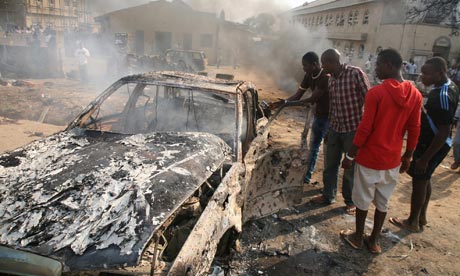- Joined
- Feb 6, 2013
- Messages
- 446
- Points
- 0
Jets join offensive in northeast Nigeria, opinion split

By Imma Ande
YOLA, Nigeria | Thu May 16, 2013 11:24am EDT
(Reuters) - Nigeria sent fighter jets in support of troops fighting increasingly powerful Islamist insurgents in its northeast on Thursday, the second day of a military offensive that has divided opinion over how best to tackle the rebellion.
A Reuters reporter saw two Alpha jets land in the city of Yola, in Adamawa state, one of three over which President Goodluck Jonathan declared a state of emergency on Tuesday, the other two being Borno and Yobe.
Jonathan has beefed up troop deployments in the northeast to counter increasingly bold and deadly attacks by Islamist group Boko Haram, which wants to create an Islamic state in Nigeria and already controls territory in the northeast.
Rights groups said they feared an escalation of the conflict that could cause large civilian deaths, but Jonathan's move enjoys public support in Nigeria, after more than three years of trying to contain the insurgency have largely failed.
Air Force spokesman Air Commodore Yusuf Anas confirmed to Reuters by telephone that "air assets", including helicopter gunships as well as jets, had been sent in support of the extra troops being deployed for the operation.
He declined to give any further details. A military source said the planes would bomb Islamist bases and training camps.
Telephone connections to Borno and Yobe were almost completely cut on Thursday. In Adawama, where a curfew was declared from 6 p.m. to 6 a.m. -- the other two states were already under curfew -- some cautiously welcomed the offensive. The three are among Nigeria's poorest and most remote states, near border areas with Chad, Cameroon and Niger.
"This state has been under the control of gunmen for so long, it's been long overdue," said Audu John, a trader in Jimeta market.
But another man, Ahmed Usman, feared civilians would become targets for killings or torture by a military notorious for abuses. His family was evacuating as soon as possible, he said.
HUMAN COST
The Islamist insurgency has cost thousands of lives and destabilized Africa's top energy producer since it began in 2009. Because it has mostly happened far from economic centers such as the commercial hub Lagos or political capital Abuja -- and because it is hundreds of miles away from oil fields in the southeast -- Nigerian elites have rarely prioritized it.
Jonathan's move will answer critics who had accused him of not taking the crisis seriously enough.
"The federal government has come to terms with the bleak reality that what we are facing is ... terrorism in its most horrific form," said an editorial in The Punch daily paper on Thursday. "Nigeria is teetering on the precipice of disintegration ... It is time to act decisively."
But the United States expressed concern about a worsening "cycle of violence" on Wednesday, a view echoed by human rights groups Amnesty International and Human Rights Watch on Thursday.
Both have documented cases of abuses by Nigerian forces including summary executions and random shootings.
"All you're doing is giving the military more powers than they had, but they were already far exceeding the powers ... and violating human rights massively," Lucy Freeman, Amnesty International's deputy program director, told Reuters by phone.
Human Rights Watch Nigeria researcher Eric Guttschuss said: "If the military continues its practice of targeting civilians, there is a risk of massive abuses during this offensive ... the military's tactics have helped fuel the spiraling violence."
(Additional reporting by Pascal Fletcher in Johannesburg, Tim Cocks in Lagos and Joe Brock in Abuja; editing by Philippa Fletcher)
